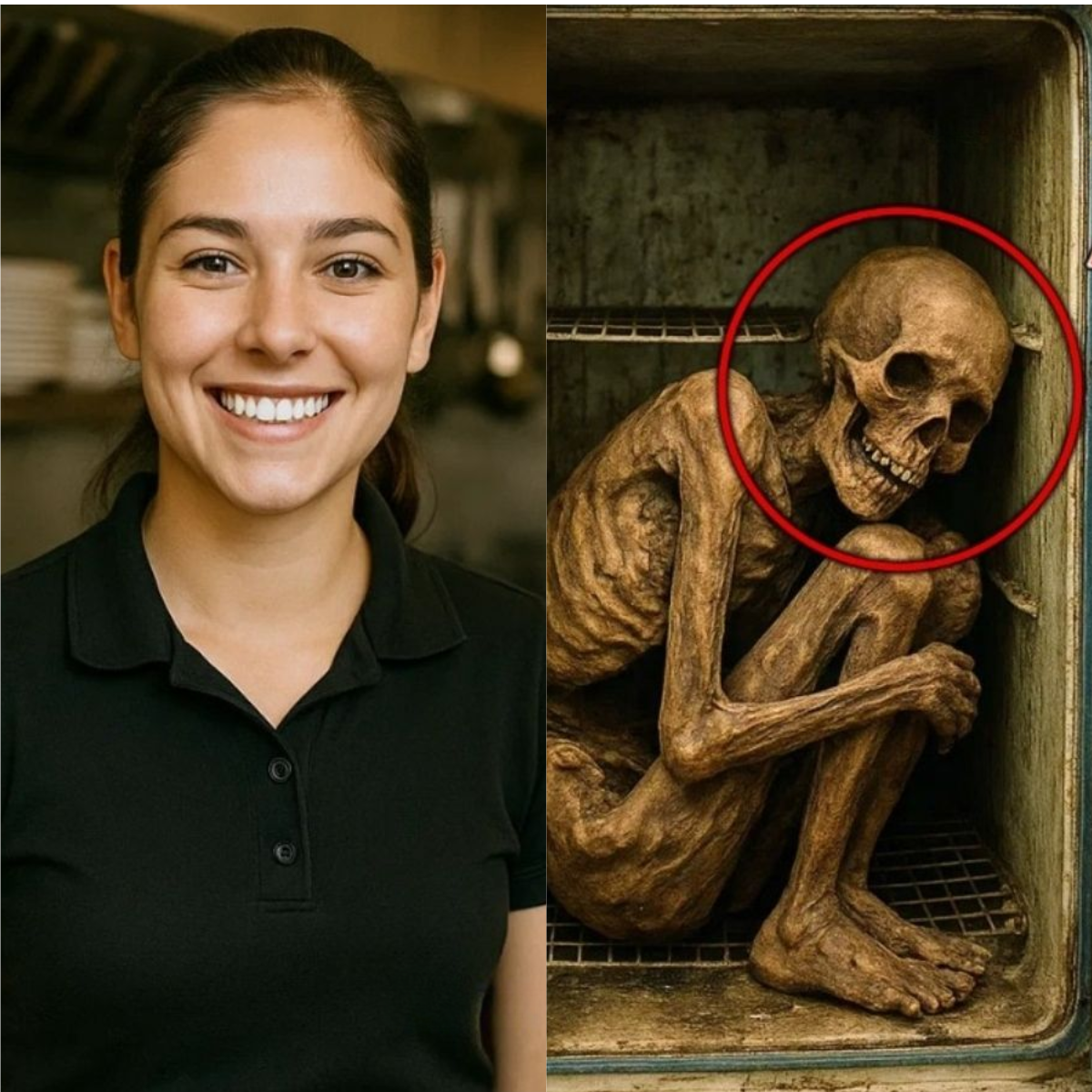A waitress disappeared during a shift in Chihuahua a year later. The cook finds this at a restaurant. Miguel Torres Sandoval was finishing cleaning the grills at the El Fogón del Norte restaurant when he noticed a loose kitchen floor tile. It was March 2012, and he’d been working there only two months. The tile moved every time he drove by on the cleaning cart. “Another thing to fix,” he thought as he bent down to examine it better. Lifting it completely, he discovered a rectangular hole cut into the concrete. Inside was a small metal box wrapped in plastic. Miguel looked toward the kitchen door.
The restaurant was closed, and he was the only employee staying for the nightly cleaning. He took the box and carefully unwrapped it. It contained a restaurant ID card, a silver ring with initials, Polaroid photographs, and a small journal. The card had the name Rosa Delgado Morales, a waitress, and the hire date was January 15, 2011.
Miguel recognized the format of the old ID cards they used before the arrival of the new computer system. He opened the journal. The cover was written in a woman’s handwriting. “If anything happens to me, find Aurelio. He knows everything about this dirty business.” August 15, 2011.
The photographs showed the interior of the same restaurant, but from unusual angles. One showed the manager’s office with documents scattered on the desk. Another captured a middle-aged man counting bills next to cardboard boxes. A third photograph showed the restaurant’s rear parking lot at night with several cars and people he couldn’t identify.
Miguel remembered hearing about an employee who had disappeared the previous year. The other employees mentioned Rosa the Waitress in casual conversation, but they always changed the subject when he asked for details. He put everything back in the box and wrapped it in plastic.
His shift ended at midnight, and the restaurant didn’t open until 7:00 the next morning. He had time to think about what to do with his find. He left the restaurant through the back door and walked to the bus stop. During the ride home, he mentally reviewed what he knew about Rosa Delgado.
Older employees had mentioned that she was a young worker who supported her family. Her disappearance occurred during a night shift, but he never learned any further details. Upon returning to his apartment, Miguel searched the internet for news about missing persons in Chihuahua in 2011. He found a short newspaper article. Local newspaper from August 20, 2011. Young waitress disappears without a trace.
Rosa Delgado Morales, 23, was last seen at her workplace on August 16. Police are investigating possible links to organized crime. The article included a photograph of Rosa. She was a young woman with long black hair, a kind smile, and expressive eyes. She was wearing the restaurant uniform in the photo.
The article mentioned that she had two younger sisters and that she helped support the family home after the death of her parents. Miguel made a decision. The next day, he would look for more information about Rosa’s family. The newspaper’s address listed a neighborhood on the outskirts of the city. If the sisters still lived there, they deserved to know that he had found something related to Rosa.
The next morning, Miguel arrived at work early and carefully observed Aurelio Vázquez Herrera, the restaurant manager. He was a well-dressed man in his 50s, who handled scheduling and payroll. The employees respected him, but Miguel noticed someone who avoided prolonged conversations with him. During lunch, Miguel took the opportunity to ask Lucía Hernández Rojas, the longest-serving employee on the morning shift, about Rosa. “She was a good coworker,” Lucía said as she poured coffee.
She always arrived on time and never complained about difficult shifts. The last night she worked, she seemed nervous. I remember her asking if anyone would stay late with her. And what happened that night? Aurelio said she left early because she felt ill, but that her purse and things were left in the closet.
The next day, she didn’t come to work, and we never heard from her again. Miguel asked where Rosa’s family lived. Lucía gave him an address in the Riveras neighborhood of Sacramento. After work, Miguel took two buses to get there. The house was small but well-kept. He knocked on the door and a young woman in her 20s came out.
“Are you looking for anyone?” she asked. “I’m looking for the Delgado family. I’m Miguel Torres. I work at the restaurant where Rosa used to work.” The woman immediately became serious. “I’m Carmen, Rosa’s sister. What do you know about her?”

Miguel explained his job at the restaurant and his discovery. Carmen invited him in and called her younger sister, Sandra, 20.
“We never believed the story that she left because of drug problems,” Carmen said. Rosa hated drugs. She had promised to get a job elsewhere because something at the restaurant had her worried. Sandra added, “The week before she disappeared, she came home very late. She said Aurelio made her do extra work, counting money and organizing papers.”
Carmen showed Miguel the last WhatsApp conversation she had with Rosa on August 16, 2011. The last message sent at 9:47 p.m. said, “Carmen, if I don’t arrive tomorrow, look at my work. Aurelio, it’s not what it seems.” Miguel showed them the box he had found. The sisters immediately recognized the ring.
It had belonged to their mother. Rosa wore it all the time. “We have to take this to the police,” Carmen said. “The detective who handled the case was Rodrigo Martínez,” Sandra recalled, “but he never took us seriously when we said something strange was going on at the restaurant.” Miguel agreed to accompany them to the police station the next day.
That night, he kept the box in his apartment and mentally prepared himself for what might come. Rosa had deliberately left clues. Someone had tried to make her disappear without a trace, but she had prepared herself for the truth to eventually come out. Closing his eyes, Miguel reviewed the details in the photographs.
The man counting money wasn’t Aurelio; it was an older man with a gray mustache and a white shirt. The cardboard boxes had labels he couldn’t clearly read, but they appeared to be for products not on the restaurant’s menu. The investigation was just beginning, but Miguel felt Rosa had been murdered for discovering something she shouldn’t have known.
Tomorrow, he would begin seeking justice for her. Carmen Delgado Morales was waiting at the police station with Miguel and Sandra. Detective Rodrigo Martínez Solano received them in his office with a skeptical expression. “Now.” “We reviewed that case exhaustively,” Martinez said as he flipped through a file. Rosa Delgado disappeared on August 16, 2011.
Investigations indicated links to drug trafficking. She probably ran away or was eliminated for debt. Carmen placed the box on the desk. This shows she knew she was in danger. Look at the photographs. The detective examined the contents with renewed attention, took the journal, and read Rosa’s notes.
These are serious allegations against Aurelio Vázquez. We need to corroborate this information. Miguel described how he found the box. It was buried under a loose tile. Someone put it there intentionally. Martinez studied the photographs with a magnifying glass. This man counting money does not appear in our case files.
“Do you recognize this person?” No one present could identify the man in the photograph. He was approximately 60 years old, had a robust build, and wore distinctive rings on both hands. “I’m going to reopen the investigation,” Martinez decided. “But I need you to maintain absolute discretion. If Rosa discovered something illegal at the restaurant, those involved could feel threatened.” If they know we have evidence.
The detective assigned Carmen a direct contact number and asked them to compile any additional information they could remember about Rosa’s last days. Sandra remembered. Rosa mentioned that Aurelio was receiving strange visitors after hours, people who didn’t come to eat, but rather met at the office. Carmen added that they had also changed the main suppliers.
Trucks arrived at night with merchandise that didn’t look like food. Miguel promised to discreetly observe the restaurant’s nighttime operations. I work the closing shift. I can verify if suspicious things still happen. Martinez reviewed Rosa’s original file. The initial report says Aurelio was the last person to see her.
He stated that she left early due to health problems. We didn’t find her purse or belongings because she supposedly took them herself. “That’s a lie,” Sandra interrupted. “Rosa never left without warning and always texted us when she got off work.” The detective showed Aurelio’s statement dated August 18, 2011.
Rosa Delgado seemed nervous during her shift. At approximately 9:30 p.m., she asked me for permission to leave because she had a stomach ache. I authorized her to leave early, and she gathered her things from the locker room and left through the front door. Carmen pointed out the contradiction. Rosa’s last message was at 9:47 p.m.
If she had already left at 9:30 p.m., how did she write to us afterward? Martínez made a note of this discrepancy. I need to interview Aurelio and other employees who were working that night again.
I’m also going to request the restaurant’s entry and exit records from that date. Andrés Montoya, the night security manager, should remember who came and went that day. The detective decided to visit the restaurant that same afternoon. We’re going to conduct a discreet inspection. Miguel, you can accompany us as a current employee. At 3:00 p.m., they arrived at the northern elfogón.
It was a medium-sized restaurant located in a busy commercial area. It had approximately 20 tables, a small bar, and the kitchen in the back. Aurelio Vázquez greeted them with professional courtesy, but Miguel noticed tension in his posture when Martínez identified himself. “Detective, is there a problem? I thought Rosa’s case was already closed?”
“New information has emerged that requires verification,” Martínez replied without elaborating. “Could you show us the facilities?” During the tour, Miguel noticed that Aurelio avoided mentioning the private office located behind the kitchen. When the detective asked about that area, Aurelio explained, “It’s just storage and my administrative office, nothing related to restaurant operations.” Martínez insisted on inspecting the office.
It contained a metal desk, files, a small safe, and several cardboard boxes stacked against the wall. Miguel recognized the same boxes that appeared in Rosa’s photographs. “What’s in those boxes?” the detective asked. “Cleaning products and office supplies,” Aurelio responded quickly.
Suppliers deliver to us in bulk to get a better price. Miguel leaned closer to examine the labels. The boxes bore company names he didn’t recognize: Distribuidora Norteña SA and Comercial del desierto Lida. There were no visible addresses on the labels.
The detective took photographs of the office and the boxes. Aurelio keeps records of these suppliers. “Of course,” Aurelio said, heading to the file cabinet. “Here are all the invoices and contracts.” As Aurelio searched for the documents, Miguel noticed his demeanor had changed. He was sweating slightly, and his movements were more jerky than usual.
“Here they are,” Aurelio said, handing over a folder. Comercial del desierto has been supplying us with cleaning products for two years. Distribuidora Norteña handles office supplies. Martínez reviewed the invoices. They were all dated correctly, and the amounts seemed appropriate for a restaurant of that size.
However, he noticed something peculiar. All the invoices were signed by the same person, Blanca Estrada Núñez, with different titles in each company. “Do you know Mrs. Estrada personally?” the detective asked. “She’s our main sales representative,” Aurelio explained. “She handles the accounts for several restaurants in the area.” Miguel interrupted.
She was the one who came in the evenings when Rosa was working. Aurelio looked at him in surprise. “I don’t know what you’re talking about. Deliveries are made during the day.” “The employees mention there were night meetings,” Miguel insisted. “You must be confused,” Aurelio replied firmly. “There are no after-hours meetings here.” The detective closed the folder.
“I need to speak to all the employees who were working when Rosa disappeared. Can you provide me with a list?” Aurelio went to his desk and prepared a handwritten list. Lucía Hernández, waitress; Héctor Ramírez, cook. Andrés Montoya, security, Patricia Guerrero, and Fernando Jiménez worked part-time.
Martínez noted that Héctor Ramírez no longer worked there. “Where can I contact Mr. Ramírez?” He resigned a few weeks after Rosa disappeared, Aurelio explained. “I don’t have his current contact information.” This information caught the detective’s attention. Why did he resign so suddenly? Personal problems.
He said he needed to move to another city for family reasons. Miguel and the detective exchanged glances. It was too much of a coincidence that the cook who worked directly with Rosa had disappeared shortly after she did. Before leaving, Martínez gave Miguel specific instructions: “Be alert for any unusual activity.
If you notice anything strange, call me immediately. Don’t confront anyone or ask direct questions.” That evening, Miguel returned to the restaurant for his night shift with a renewed perspective. He observed every detail: who came in, what they did, how Aurelio behaved during closing hours.
At 11:30 p.m., when the last client left, Miguel noticed that Aurelio hadn’t gone home as usual. Instead, he remained in the office, quietly making phone calls. Miguel pretended to clean near the office to listen to snatches of conversation. The detective was here today. “Yes, he asked about the boxes.
No, he didn’t see anything important. We have to be more careful.” The call ended abruptly when Aurelio noticed Miguel nearby.
Family games
“Are you done cleaning?” he asked. Then he heard the back door open and close. Miguel waited five minutes before sticking his head out.
Aurelio had left, but his car was still in the main parking lot. Miguel decided to investigate the office while Aurelio was away. The door was open, and he was able to enter without difficulty. He quickly checked the desk and found a notebook with coded notes, numbers, dates, and initials that didn’t mean anything obvious.
One page had the date August 16, 2011, with the initials RD and a question mark. Below it was a phone number and the words “problem solved.” Miguel photographed the page with his cell phone and returned to the kitchen. Moments later, Aurelio returned accompanied by an older woman Miguel hadn’t seen before. “Miguel,” Aurelio called him. “You can go now.
We’ll be closing tonight.” Miguel quickly finished his work and left, but remained on guard from the street. The woman and Aurelio worked in the office for over an hour, moving boxes and documents. That night, Miguel called Detective Martinez and reported his observations. He texted him the photograph of the notebook.
Miguel, you’ve done an excellent job, Martinez said. Tomorrow we’re going to begin the formal investigation. In the meantime, stay safe and don’t do anything that could put you in danger. Miguel went to sleep that night knowing he had set in motion an investigation that could reveal the truth about what had happened to Rosa Delgado Morales.
Detective Martinez arrived early at the precinct and began reviewing Rosa Delgado’s original file. The investigator initially assigned had been Detective Carlos Ruiz, who had retired six months after the case. Martinez contacted Ruiz by phone. “Carlos, I need information on the Delgado case from August 2011,” Rosa, the restaurant waitress, Ruiz recalled.
“Strange case. The evidence pointed to drug problems, but something didn’t convince me. The family insisted she didn’t use substances. What made you close the case as voluntary escape? Pressure from above. The division chief said we had bigger cases.”
Besides, the restaurant manager had A good reputation in the community. This information confirmed Martínez’s suspicions. She decided to independently investigate Aurelio Vázquez Herrera. Meanwhile, Carmen Delgado was visiting Rosa’s former coworkers. Patricia Guerrero Vega had worked as a part-time waitress there during 2011.
“Rosa was scared the last few weeks,” Patricia told her at her home. “She told me she’d seen strange things at the restaurant: people arriving after closing time, trucks unloading at night. “Did he tell you what kind of merchandise?” Not clearly, but she mentioned that the boxes were too heavy to hold only food or normal supplies and that Aurelio had forbidden her from being in the kitchen when special deliveries arrived.
Patricia recalled a specific incident. One night Rosa was cleaning and heard a loud argument in the office. Someone was yelling at Aurelio about missing money. The next day, Aurelio changed the locks and said only he could be in the restaurant after closing time. Carmen took note of all the details.
Patricia gave her the phone number of Fernando Jiménez Ortega, who had worked making deliveries for the restaurant. Fernando seemed nervous when Carmen contacted him. I prefer not to talk about that place. I had problems after Rosa disappeared. What kind of problems? Aurelio fired me without explanation.
He said they no longer needed a delivery service, but I knew the restaurant continued to make deliveries with someone else. Fernando agreed to meet Carmen at a downtown café. He explained that his job included regular food deliveries, but occasionally Aurelio asked him to transport boxes to residential addresses. I never found out what the boxes contained.
Aurelio said they were special gourmet products for important clients, but the addresses were ordinary houses, not restaurants or hotels. Carmen asked him if he remembered any of those addresses. Fernando took out his phone and reviewed his old GPS records. Here are three addresses where I took those special boxes in August 2011:
Colonia Campestre, Colonia Los Nogales, and a house on the outskirts toward the Juárez highway. At the police station, Detective Martínez had obtained troubling information about Aurelio Vázquez. His criminal record showed a 2009 civil lawsuit alleging financial irregularities at a previous restaurant where he had worked as a manager.
Martínez also investigated the supplier companies mentioned on the invoices: Distribuidora Norteña SA.
Family games
It had a valid business registration, but the address was for a small office that rented space by the day. It had been dissolved in January 2012, five months after Rosa’s disappearance. The detective visited the northern distributor’s office. The receptionist informed him that Blanca Estrada Núñez had canceled her contract in December 2011. “Mrs. Estrada handled several business accounts,” the receptionist explained. “She was authorized to use our legal name in contracts with restaurants and food businesses.”
Martínez asked for a current contact address for Blanca Estrada. The receptionist consulted her files and provided a phone number and address in the Valle neighborhood. He remembers something unusual about Mrs. Estrada’s operations, except that she always paid in cash and never wanted itemized receipts.
She said her clients preferred simple transactions. That same afternoon, Martínez visited Blanca Estrada’s address. The house was empty with a for sale sign in the front yard. Neighbors reported that the family had moved suddenly in January 2012. “They left overnight,” an elderly neighbor explained. “They said they had a family emergency in another state.”
They sold the house very quickly, below market value. Miguel, on his night shift, began documenting the situation. He meticulously monitored the restaurant’s activities. He noticed that Aurelio stayed up very late on Tuesdays and Fridays, days that seemed to coincide with special deliveries. Lucía Hernández provided him with additional information about Rosa.
The week before she disappeared, Rosa arrived one day with extra money. She said Aurelio had given her a bonus for extra work, but we were never told what those jobs entailed. Rosa specifically mentioned what she did after hours. She said she counted inventory and organized documents, but she also mentioned that she had seen things that worried her.
She wouldn’t give details, only saying that she was gathering evidence just in case. Miguel realized that Rosa had been documenting the restaurant’s illegal activities, but had been discovered before she could turn the information over to the authorities. That night, after Aurelio left, Miguel examined the spot where he had found the box more carefully.
He discovered marks on the floor indicating that other tiles had also been recently removed. Under another tile, he found a second, smaller hiding place. It contained a piece of paper with phone numbers and the address. from a warehouse on the outskirts of the city. A note in Rosa’s handwriting read: “Main Warehouse. Everything is stored here. Large deliveries on Wednesdays.” Miguel photographed all the information and sent it to Detective Martínez with a message.
Rosa knew more than we thought. I found a second location. The investigation was revealing a complex operation that had cost Rosa her life. Miguel was beginning to understand why she had been so afraid in her final days.
Detective Martínez gathered Carmen, Sandra, and Miguel at the police station to analyze the new evidence. He had investigated the warehouse address Rosa had noted. The warehouse officially belongs to a transport company called Logística del Norte, Martínez explained. But the registered owner is Gustavo Estrada Núñez, Blanca Estrada’s husband. Carmen connected immediately. The same woman from the fake restaurant invoices.
Miguel added information he had gathered. Andrés Montoya, the security guard, told me that in August 2011, there were changes in protocols. Aurelio installed new security cameras, but only in the dining area, not in the kitchen or the office. Martinez had gotten more information about Hector Ramirez Castillo, the cook who had resigned after Rosa’s disappearance. Hector moved to Torreón immediately after resigning. I got his current address.
The detective traveled to Torreón to interview Hector. He found him working at a taco stand in the municipal market. When he saw Martinez, Hector became visibly nervous. “I have nothing to say about the restaurant,” Hector said without making eye contact. “Rosa Delgado had hidden evidence of illegal activities. I think you know what happened to her.”
Hector looked around to make sure no one was listening. “If I speak up, my family will be in danger. They’re already investigating. Your silence won’t protect them.” After an hour of conversation, Hector agreed to share what he knew. Aurelio didn’t run a normal restaurant; he used the place to launder money from other operations. Hector explained the scheme.
Blanca Estrada brought in cash twice a week. We counted it and included it as restaurant income. Fake invoices from suppliers accounted for the extra money.
Family games
Rosa discovered this. Rosa began to dig deep after closing time and saw the entire operation. Hector described the night of August 16. Rosa confronted Aurelio with photographs she had secretly taken. She told him she would turn them over to the police if he didn’t stop the money laundering. What did Aurelio do? He called Blanca Estrada. She arrived with two men she didn’t know.
They said Rosa knew too much and they had to resolve the problem permanently. Hector began to cry. I was hiding in the pantry. I heard Rosa begging them to let her go. She promised not to say anything, but they had already made up their minds. The detective asked for specific details about what she had witnessed.
Hector explained that Rosa had been beaten until she fainted and taken out of the restaurant in one of the large crates they used for transport. Why didn’t he report this immediately? Blanca threatened me. She said they had my address and my family’s.
They paid me extra money to keep quiet and told me I had a week to leave the city. Hector gave Martinez the phone numbers he remembered from the calls between Aurelio and Blanca, as well as a description of the two men who had participated in Rosa’s kidnapping. Back in Chihuahua, Martinez shared this information with Carmen and Miguel.




